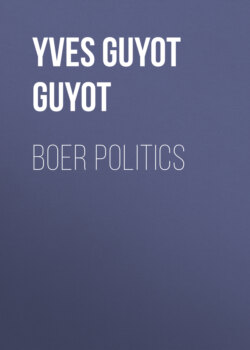Читать книгу Boer Politics - Yves Guyot Guyot - Страница 7
На сайте Литреса книга снята с продажи.
The Profits from the Jameson Raid.
ОглавлениеThe trial by the Government of Pretoria of the sixty-four members of the "Reform Committee" was held in Johannesburg. Four of them, Mr. Lionel Phillips, Colonel Rhodes, Mr. George Farrar, and Mr. Hammond were condemned to death. The remainder were sentenced to two years' imprisonment and £2,000 fine, or failing payment, to another year's imprisonment and three years' banishment. The Executive reserved to themselves the right to confiscate their property.
In commutation of the four death sentences, the Government exacted £100,000; fifty-six other prisoners paid in a sum of £112,000. One of the accused died, another who had pleaded not guilty, was so ill that his sentence was not carried out; Messrs. Sampson and Davies refused to pay the fine. The British Government left Mr. Krüger a free hand in the matter; it cannot be reproached with having interposed on their behalf—although it was its own representatives who persuaded the Johannesburg conspirators to deliver up their arms. In the moment of danger many and various hopes were held out by Mr. Krüger in his proclamation of December 30th, 1895. The danger once past, the promises were forgotten. He remembered the Jameson Raid only as an excuse for demanding an indemnity of £677,938 3s. 6d. for material damages, and a further £1,000,000 for damages "moral and intellectual."
In February, 1896, Mr. Chamberlain proposed to him "the autonomy of that portion occupied by mining industries" (see details of the proposal, letter of Mr. Chamberlain, published in Le Siècle, July 5th, 1899.) Mr. Krüger refused contemptuously. At the same time he got the Volksraad to pass a bill giving him the right to expel any foreigner, at his discretion, at a fortnight's notice. Mr. Chamberlain reminded him that this bill was contrary to Act 14 of the Convention of 1884. Krüger took no notice of this remonstrance, and the bill became law on October 24th. In December, 1896, Mr. Chamberlain made a renewed protest.
The correspondence continued. Mr. Chamberlain recapitulated the breaches of the Convention of 1884 committed by the Boer Government. In the summer of 1897, the act was at last repealed, but always with the unavowed intention of re-enacting it in another form.
Mr. Krüger persistently continued to refuse all demands for reform, becoming more and more insolent, while, thanks to the wealth brought to the exchequer by the gold mines, he continued to increase the very armaments against which the petitioners of 1894 had protested.
To all representations, his answer was "The Jameson Raid." To all Europe, his plea was "The Jameson Raid." If you mention Transvaal affairs to a Pro-Boer, he shuts you up at once with "what about the Jameson Raid?" He will listen to no arguments; and loses his temper. If you suggest that the Jameson Raid bears a certain analogy to the expedition of Garibaldi's One Thousand, he gazes at you with amazement. If you proceed to remark that the Jameson Raid took place at the close of the year 1895; that we are now in 1900; that it is res judicata; that the British Government left Boer Justice a free hand to deal with the conspirators, he accuses you of having been bought by England. Not a whisper, of course, is heard about the millions of secret service money placed at the disposal of Dr. Leyds.
